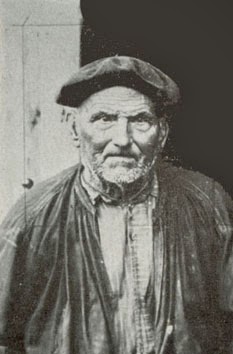All over the world, people have a tendency to demonize others, to view others as different, as inferior, as outcasts. In Japan, there are the Burakumin; in India, the Dalit. Sometimes there is an ethnic or religious component to this marginalization, but not always. In Europe, there is a group of people who have been viewed as tainted, as inferior. In some parts of France, they were called Cagots, Ladres, or Colliberts. In the Basque Country, they were called Agotes.

- Little is known about the origins of the Agotes. That they were outcasts is certain, though exactly why is less clear. They aren’t a distinct ethnicity, so that isn’t the reason. There is some thought that their status was linked with leprosy. In any case, their status was hereditary: once a family was identified as Agote, their descendants also carried the stigma. They were forced to live away from others, to identify themselves with some badge, and to not touch food or water that was not separated from everyone else’s.
- However, as opposed to those with leprosy, Agotes were not completely shunned physically, even though they were not afforded economic or political rights. Some believed that they had been punished by God for some moral failing (including being descendants of the carpenters who built the cross Jesus was crucified on), and thus their banishment was just. Some thought they were descended from Arians or primitive Christians who had been isolated in the mountains. They were always the other: on the south side of the Pyrenees, they were from the north, and vice versa.
- In early descriptions, Agotes had attributes that varied wildly from author to author, ranging from the very negative – clumsy, unintelligent, miserable, sickly, lascivious – to the extremely positive – intelligent, docile, hard-working, haughty, brave. Sometimes, they were described as having magical powers, fabulous wealth, or colossal strength.
- Even though they practiced the same religion as their neighbors, they were forced to use a separate door, often short so they were forced to bow; they had separate fonts for holy water; and they received the eucharist on the end of a stick or spoon.
- They often took on manual jobs and careers, from ironworkers and blacksmiths to weavers and seamstresses, and, in particular, all jobs related to wood. On the coasts, they took the most dangerous jobs in the ports. They were limited in the types of jobs they could take, being forced into these types of manual labor trades.
- They were excluded from public office and the use of community lands. If they tried to marry into non-Agote houses, they were often forbidden from taking on the house name. And, in the Roncal valley, they were not allowed to use the common red trim on their cloaks, being forced to wear yellow to distinguish them from their neighbors.
- Basque Moonshiners have named their single malt whiskey Agot after these marginalized peoples.
Kerexeta Erro, Xabier. Agote: etnología e historia. Auñamendi Encyclopedia. Available at: https://aunamendi.eusko-ikaskuntza.eus/en/agote-etnologia-e-historia/ar-10045/; Cagot, Wikipedia.
Discover more from Buber's Basque Page
Subscribe to get the latest posts sent to your email.


Never heard of these people.
We are all AGOTES. Gora Euskadi Askatuta